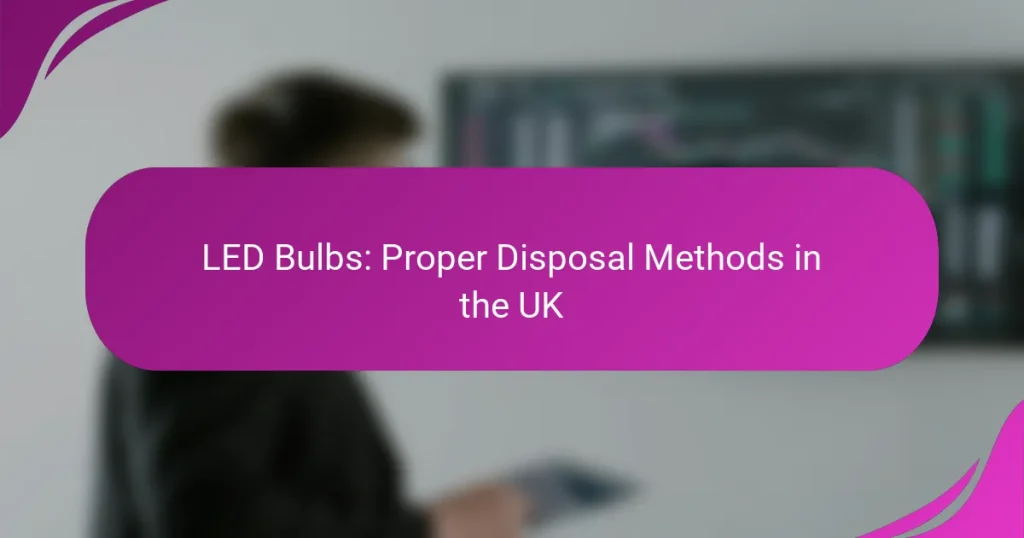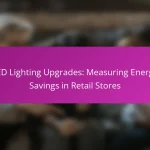Proper disposal of LED bulbs in the UK is essential to prevent environmental harm caused by hazardous materials. Instead of discarding them in general waste, individuals should utilize local recycling options, designated collection points, or take-back schemes. Adhering to the Waste Electrical and Electronic Equipment (WEEE) Directive ensures that these bulbs are recycled safely and sustainably, protecting both ecosystems and public health.

How to properly dispose of LED bulbs in the UK?
To properly dispose of LED bulbs in the UK, you should avoid throwing them in general waste due to their components. Instead, utilize recycling options available through local councils, designated points, or take-back schemes to ensure safe and environmentally-friendly disposal.
Recycle at local council facilities
Local council facilities in the UK often provide recycling services specifically for LED bulbs. Check your council’s website for details on drop-off locations and any specific guidelines they may have. Many councils accept bulbs at recycling centres, making it convenient to dispose of them responsibly.
When visiting these facilities, ensure that the bulbs are intact and packaged securely to prevent breakage. Some councils may have specific collection days or events dedicated to hazardous waste, so staying informed can help you plan your visit effectively.
Use designated recycling points
Designated recycling points are available in various locations, including supermarkets and DIY stores. These points are specifically set up to collect LED bulbs and other light fixtures, making it easy to recycle them while you shop. Look for bins marked for light bulb recycling.
Before disposing of your bulbs at these points, check if there are any restrictions on the types of bulbs accepted. Most points will accept standard LED bulbs, but some may not take specialty bulbs like halogen or fluorescent types.
Participate in take-back schemes
Many retailers in the UK offer take-back schemes for LED bulbs, allowing customers to return used bulbs when purchasing new ones. This initiative not only promotes recycling but also encourages responsible consumption. Check with your local stores to see if they participate in such programs.
When using a take-back scheme, ensure you follow the store’s guidelines on how to return the bulbs. Some retailers may have specific limits on the number of bulbs you can return at a time, so it’s wise to inquire beforehand to avoid any inconvenience.
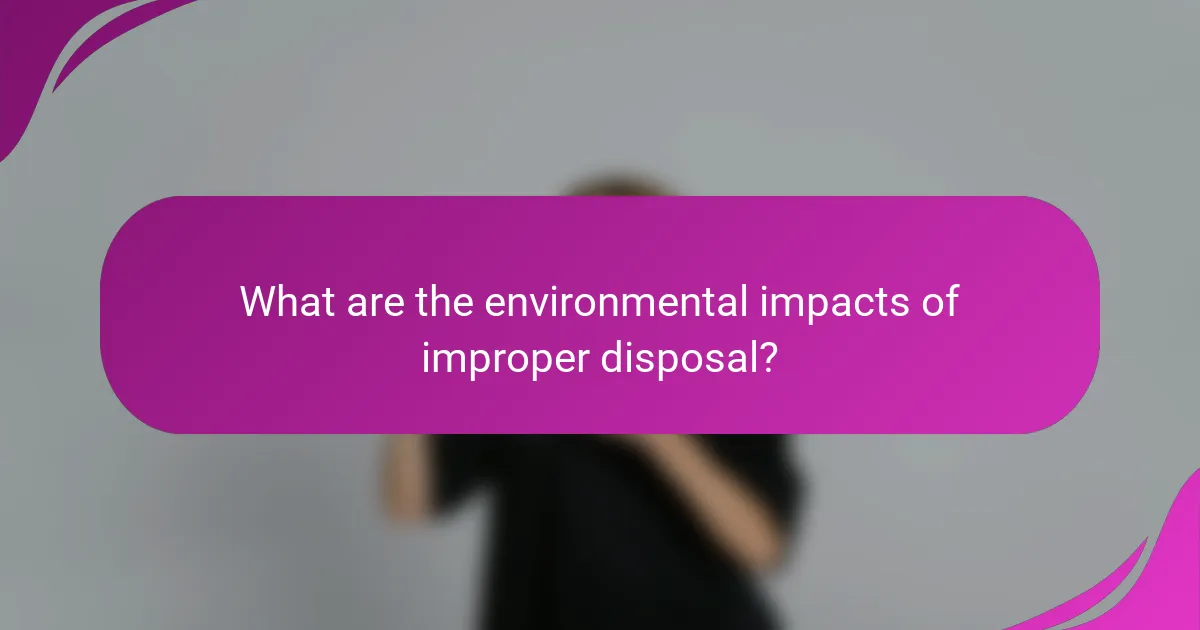
What are the environmental impacts of improper disposal?
Improper disposal of LED bulbs can lead to significant environmental issues, primarily due to the release of hazardous materials and the increase in landfill waste. These impacts can harm ecosystems and public health, making responsible disposal crucial.
Release of hazardous materials
LED bulbs contain small amounts of hazardous substances, such as lead and phosphor. When disposed of improperly, these materials can leach into the soil and groundwater, posing risks to both wildlife and human health.
To mitigate these risks, it is essential to recycle LED bulbs through designated collection points or recycling programs. Many local councils in the UK offer specific drop-off locations for hazardous waste, ensuring that harmful materials are handled safely.
Increased landfill waste
Improper disposal of LED bulbs contributes to the growing problem of landfill waste. While LED bulbs are more energy-efficient than traditional bulbs, they still take up space in landfills and can take years to decompose.
To reduce landfill impact, consumers should seek out recycling options. Many retailers and local authorities provide recycling services for LED bulbs, making it easier for individuals to dispose of them responsibly and minimize waste.
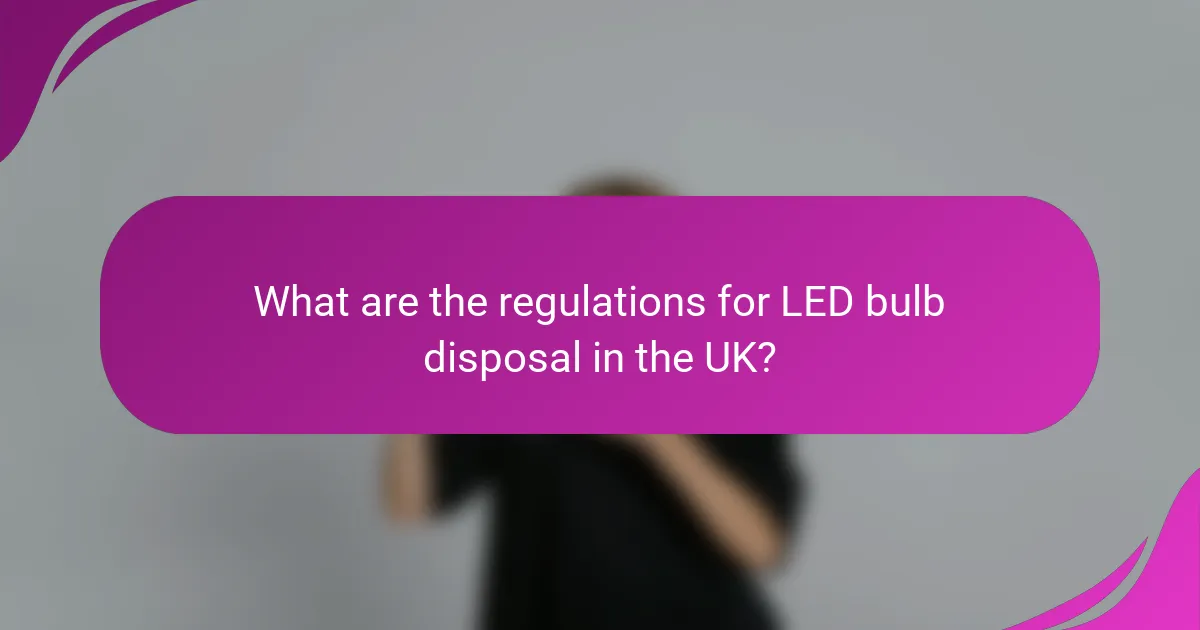
What are the regulations for LED bulb disposal in the UK?
In the UK, LED bulb disposal is regulated under the Waste Electrical and Electronic Equipment (WEEE) Directive, which mandates proper recycling and disposal to minimize environmental impact. Consumers are encouraged to return used bulbs to designated collection points to ensure they are handled safely and sustainably.
Waste Electrical and Electronic Equipment (WEEE) Directive
The WEEE Directive aims to reduce electronic waste and promote recycling. Under this regulation, LED bulbs are classified as electronic waste, requiring specific disposal methods to prevent hazardous materials from entering landfills.
Manufacturers and retailers must provide information on how to dispose of LED bulbs responsibly. This includes offering take-back schemes or directing consumers to local recycling facilities where they can drop off their used bulbs.
Local council guidelines
Local councils in the UK often have specific guidelines for disposing of LED bulbs. Many councils provide dedicated recycling points or collection services for electronic waste, including light bulbs.
To find the nearest disposal location, residents should check their local council’s website or contact them directly. It is essential to follow these guidelines to ensure compliance with local regulations and contribute to environmental sustainability.
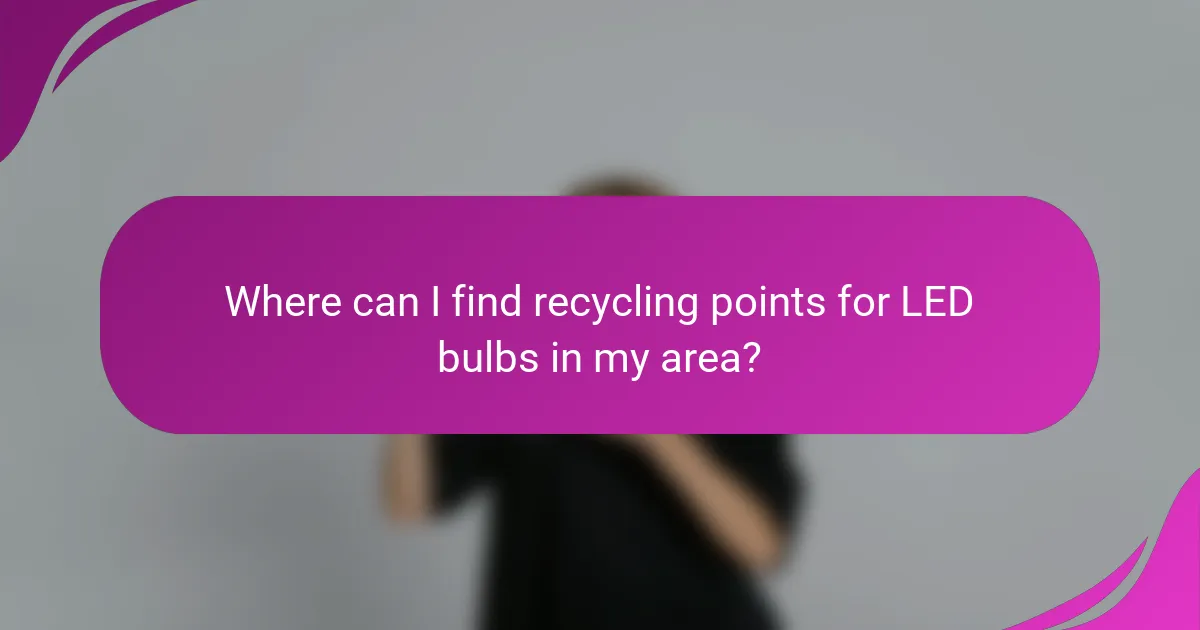
Where can I find recycling points for LED bulbs in my area?
You can find recycling points for LED bulbs in your area through local council resources and dedicated recycling locator apps. These options help you identify the nearest facilities that accept LED bulbs for proper disposal, ensuring they are recycled responsibly.
Local council websites
Your local council’s website is a reliable source for finding recycling points for LED bulbs. Most councils provide a list of designated recycling locations, along with information on collection days and accepted materials. Check your council’s site for specific details tailored to your area.
Additionally, many councils offer guidance on how to prepare LED bulbs for recycling, such as removing any packaging. This ensures that the recycling process is efficient and compliant with local regulations.
Recycling locator apps
Recycling locator apps can simplify the process of finding LED bulb recycling points. These apps typically allow you to enter your postcode to find nearby facilities that accept various types of waste, including LED bulbs. Popular apps in the UK include Recycle Now and Waste Wizard.
Using these apps can provide real-time information on recycling options and may even offer directions to the nearest locations. Make sure to check the app for any specific instructions regarding the disposal of LED bulbs to ensure proper recycling.

What are the benefits of recycling LED bulbs?
Recycling LED bulbs offers significant advantages, including conserving natural resources and reducing environmental harm. Proper disposal helps recover valuable materials while minimizing the ecological impact of waste.
Conservation of resources
Recycling LED bulbs allows for the recovery of precious metals and materials, such as aluminum, glass, and rare earth elements. These resources can be reused in the production of new bulbs or other electronic devices, reducing the need for mining and extraction.
By recycling, the demand for new raw materials decreases, which can lead to lower energy consumption and a smaller carbon footprint associated with manufacturing processes. This is particularly relevant in the UK, where sustainable practices are increasingly prioritized.
Reduction of environmental harm
Improper disposal of LED bulbs can lead to hazardous materials, such as lead and mercury, contaminating soil and water sources. Recycling helps prevent these substances from entering the environment, thus protecting ecosystems and public health.
In the UK, regulations dictate that businesses and households must dispose of LED bulbs responsibly. Utilizing designated recycling points or collection schemes ensures that these bulbs are processed safely, further mitigating environmental risks.
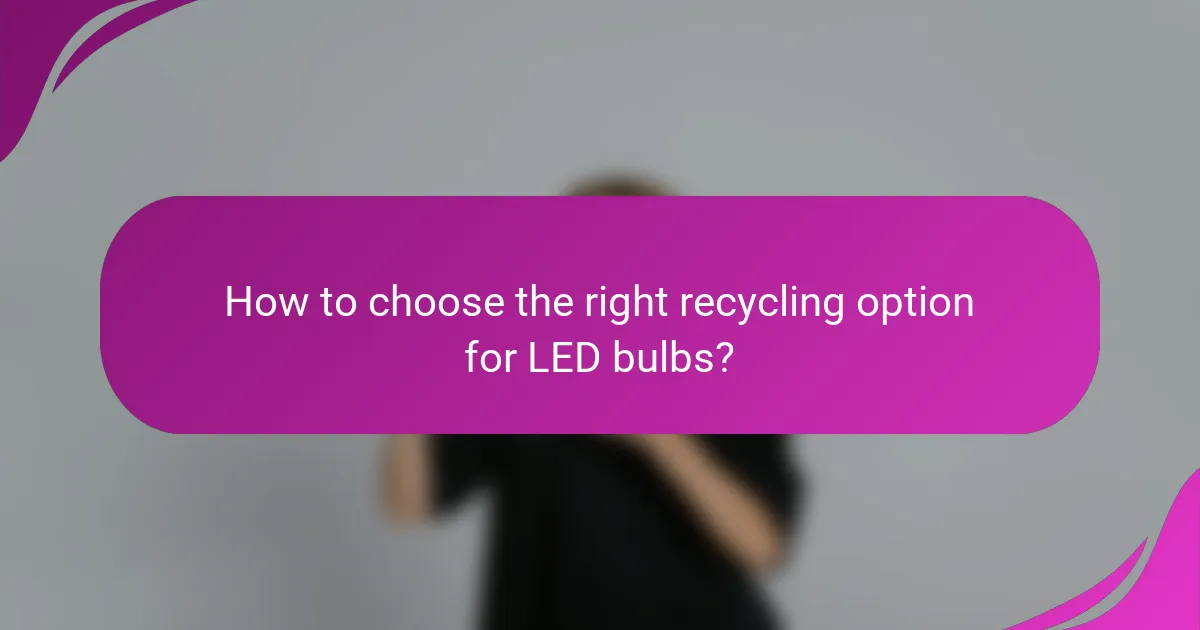
How to choose the right recycling option for LED bulbs?
To choose the right recycling option for LED bulbs in the UK, consider local recycling facilities, collection points, and any specific regulations that apply. Proper disposal is crucial due to the presence of hazardous materials like mercury in some LED bulbs.
Assess convenience and accessibility
When selecting a recycling option for LED bulbs, convenience and accessibility are key factors. Look for local recycling centers that accept LED bulbs or check if your local council provides collection services. Many retailers also offer take-back schemes, making it easier to recycle your bulbs when purchasing new ones.
To find the nearest recycling facility, use online tools or local council websites. Ensure that the location is easy to reach and has suitable hours for drop-off.
Consider environmental impact
Evaluating the environmental impact of your recycling choice is essential. Recycling LED bulbs helps reduce landfill waste and prevents harmful substances from entering the environment. Check if the recycling facility follows proper environmental standards and practices.
Additionally, consider the carbon footprint associated with transporting the bulbs to the recycling center. Opt for local options to minimize travel distances and support community recycling efforts.
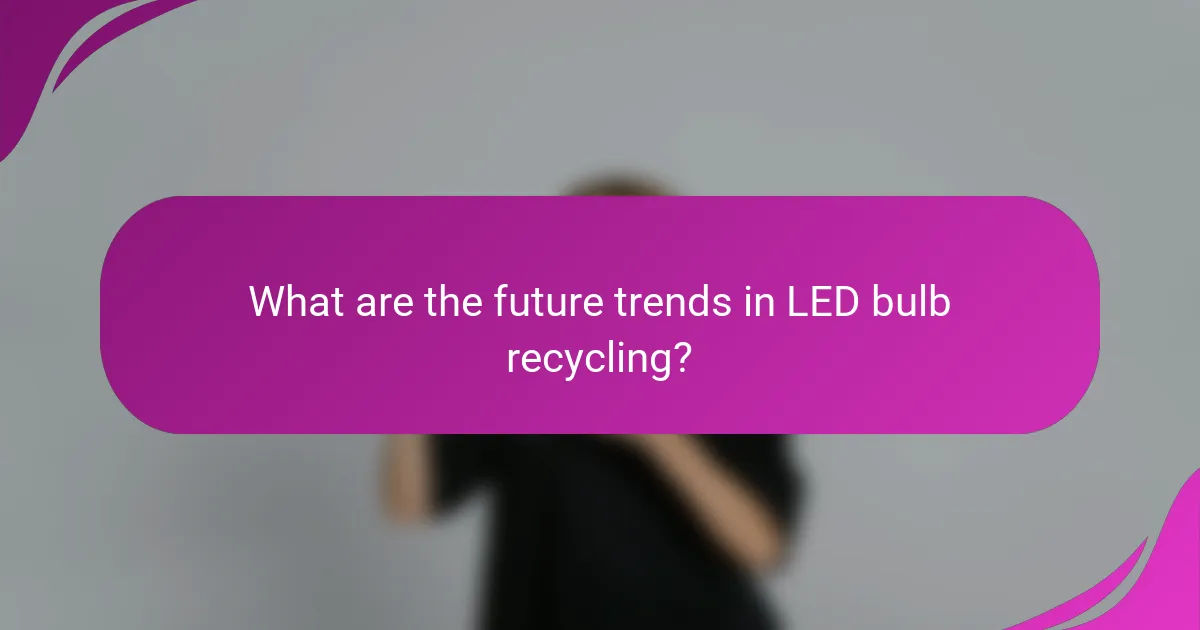
What are the future trends in LED bulb recycling?
Future trends in LED bulb recycling focus on improving efficiency and increasing the recovery of valuable materials. Innovations in recycling technologies and stricter regulations are expected to enhance the overall sustainability of LED bulb disposal in the UK.
Advancements in Recycling Technology
Recycling technology for LED bulbs is evolving, with new methods being developed to separate and recover components more effectively. Techniques such as hydrometallurgical processes can extract metals like gold and silver from circuit boards, which are often found in LED bulbs.
Additionally, automated sorting systems are becoming more common, allowing for faster and more accurate processing of waste materials. This reduces contamination and increases the overall yield of recyclable materials.
Regulatory Changes and Compliance
The UK government is tightening regulations around electronic waste, including LED bulbs, to promote better recycling practices. The Waste Electrical and Electronic Equipment (WEEE) Directive mandates that producers take responsibility for the disposal of their products, encouraging them to invest in recycling initiatives.
Businesses and consumers must stay informed about these regulations to ensure compliance and avoid potential fines. Understanding local disposal requirements is crucial for proper recycling practices.
Consumer Awareness and Participation
As awareness of environmental issues grows, consumers are becoming more engaged in recycling efforts. Educational campaigns are helping to inform the public about the importance of recycling LED bulbs and the proper disposal methods available.
Participation in recycling programs is expected to increase, with more collection points being established in communities. Encouraging consumers to return used bulbs to designated recycling locations can significantly improve recycling rates.
